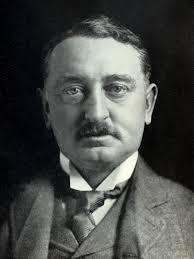Search
Cecil John Rhodes

Born - Died
Cecil John Rhodes a British businessman and politician.
Rhodes was born July 5th, 1853 in Bishop's Stortford, England. He attended the Bishop's Stortford Grammar School starting at the age of 9. At the age of 16 he was removed from the school. Rhodes was a sickly child who was asthmatic and some believed he had tuberculous. After his father schooled him for a time at home, Rhodes was sent to live with his brother in South Africa. His father hoped the sea voyage and warmer climate might improve Rhodes health, this was a common practice at the time.
When first in South Africa, Rhodes lived on money lent by his aunt. He also developed an interest in agriculture and joined his brother on his brother's cotton plantation. Unfortunately the land was not well suited for cotton and the plantation failed.
In 1871, Rhodes and his brother headed to the diamond fields of Kimberly. He was financed by N.M. Rothschild & Sons and over the next 17 years bought the smaller diamond mine operations in Kimberly. In 1890 he held a monopoly on the World's diamonds after he made a deal with the London based Diamond Syndicate.
In 1873, Rhodes returned to England to attend Oriel University, Oxford. He only stayed for one term in 1873. In 1876 he returned to complete his second term. At Oxford John Ruskin's inaugural lecture caught Rhodes attention. This reinforced Rhodes belief in British Imperialism.
While in Oxford, Rhodes continued to maintain contact with his holdings in Kimberly. In 1888, along with his partner C.D. Rudd they formed the De Beers Consolidated Mines. The company was named after the previous Dutch owners of the land.
In 1880, Rhodes entered local politics in the Cape Colony. He was elected into the Cape House of Assembly and the Cape Parliament. He was eventually elected as Prime Minister of the Cape Colony. As Prime Minister he began passing laws benefiting land and mine owners while displacing smaller land owners. Rhodes did not have any power over the Boer Republic of the Transvaal which was to the North of Cape Colony. The Transvaal government was, in the opinion of Rhodes, not supportive of the mine owners. This led to several confrontations between Rhodes and the government. A raid approved by the Secretary of State of Cape Colony led to the resignation of Rhodes and the Second Boer War.
Rhodes used his wealth and the wealth of his business partners to negotiate to for mineral rights in Africa. In 1889 Rhodes convinced the Colonial office to let him create the British South Africa Company (BSAC). The BSAC had it's own police force, although it could be argued it was a private military force used to control areas held by BSAC. The vast area was controlled by the BSAC was named Rhodesia in 1894. Eventually the area was broken into separate pieces and became modern day Zimbabwe and Zambia among others.
Rhodes believed the Anglo-Saxon race was the superior race on the planet. He stated in his will he believed regions controlled by the British Empire were the better for it and he dreamed of a day the World fell under British rule. Also in his will he established a scholarship open to any citizen of the British Empire, Germany and the United States. He included the United States because he hoped they'd breed philosopher-kings who'd convince them to rejoin the British Empire. He included Germany because he believed one day the three nations were destined to become the peace keepers of the World.
On March 26th, 1902, Rhodes passed away from heart failure.
Rhodes became a member of Apollo University Lodge. Initially he did not approve of the organization, although he remained a mason his entire life. Freemasonry also influenced him to envisage a secret society whose goal was to bring all of the World under British rule.
This article provided by Brother Eric C. Steele.